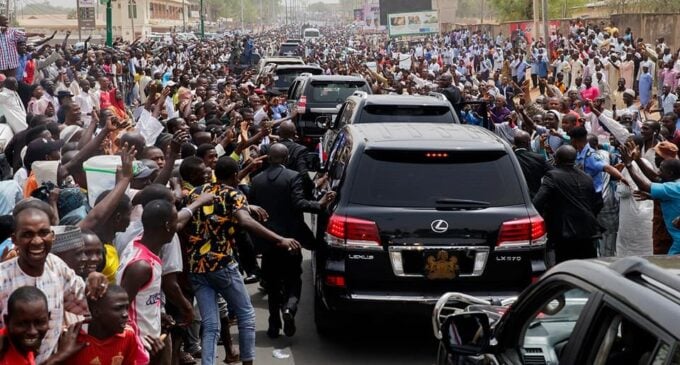
Anambra state governor, Charles Soludo, says it has become insensitive for state governors to ride around town in convoys of “20-something cars”, for instance.
Soludo noted that members of the Nigerian political class have been looking at themselves in the mirror after the removal of the petrol subsidy.
The governor said this during a chat with state house correspondents after the five-hour National Economic Council (NEC) meeting at the presidential villa in Abuja on Thursday, July 20.
He noted that the council recognises that the issue of convoy concerns every tier of government and it should be properly addressed.
“We mustn’t live…even the cost of running the state, the way we even live; someone gave an example of a state governor going with 20-something vehicles in a convoy, and all these have to be fuelled, and so forth,” he said.
Soludo added that governors and members of the council spoke to themselves about how everyone needs to adhere to the austerity measures of the times and partake in the sacrifices the people demanded.
“And the fact that even amongst ourselves, almost like in a peer review kind of setting, we are talking to ourselves,” he said.
“Hey gentlemen, we would need to be sensitive to the times, we need to live within the average of the people that we’re governing and so on and so forth and knock off the waste and the irrelevancies, so to speak.”
Solido urged the council members to look inwards and make adjustments:
“When I assumed office, for example, it was costing about N137 million every month to clean up public offices, and so on. Today, in Anambra, we’re doing N11 million a month from N137 million on a monthly basis; this is just an illustration.
He disclosed that the council discussed the possibility of negotiating a new minimum wage amid spiralling inflation and high cost of living.
He said the allocation to be shared among federating units for July will be around N900 billion, not N2 trillion, to moderate the impact on the system.
Vice president Kashim Shettima chairs the NEC by the provisions of Nigeria’s constitution.
The NEC meeting, which is held monthly, deliberates on the coordination of the economy and discusses the programmes of the various levers of government.
The council is made up of the 36 state governors, the governor of the Central Bank of Nigeria (CBN), the minister of finance, secretary to the government of the federation and other government officials and agencies whose tasks revolve around the economy.
